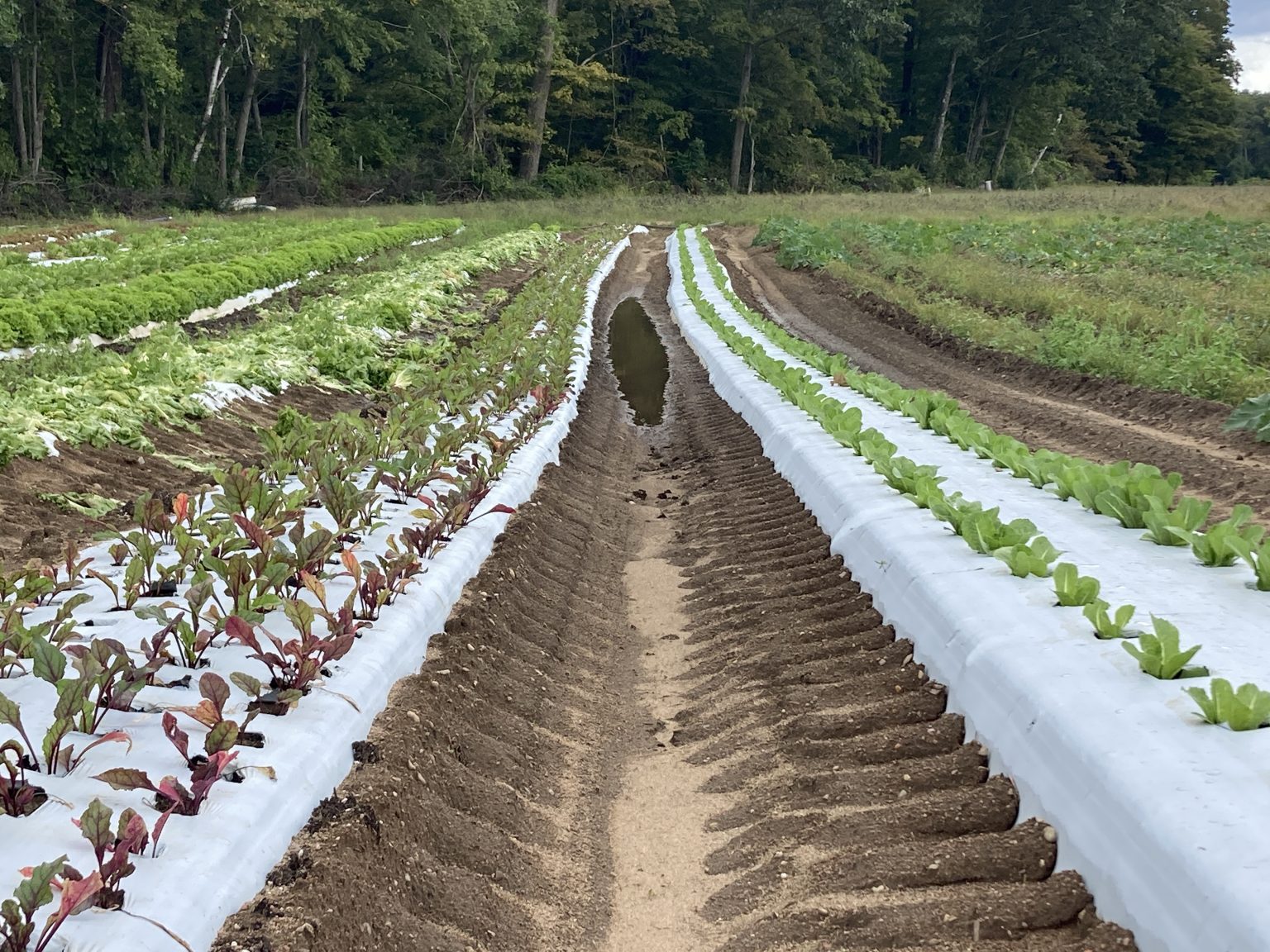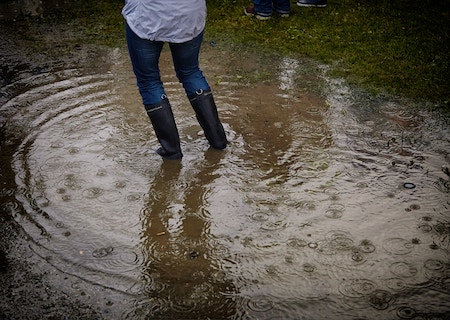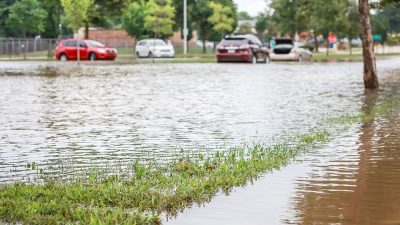Be Ready for Flooding and Hurricanes in Connecticut
Flooding and hurricanes are among the most destructive natural disasters affecting Connecticut communities. UConn Extension, through the Extension Disaster Education Network (EDEN), provides trusted, science-based resources to help individuals, families, farmers, and municipalities prepare for, respond to, and recover from these powerful events.
Our goal is to equip you with the knowledge and tools needed to reduce risk, protect lives and property, and build long-term resilience. From emergency planning and evacuation tips to recovery assistance and mitigation strategies, our resources are tailored to the unique challenges of flooding and hurricanes in the Northeast.
Browse our guides, checklists, and local information to stay safe and prepared—before, during, and after the storm.
Featured Publications

Managing Flood Risks on Farms
Fruit and vegetable growers in flood-prone regions need to manage flood risks. There are strategies to prepare for, respond to, and recover from flooding events, including actions to take, when to implement them, how to execute them, and why they are essential.

Flood Food Safety for Fruit and Vegetable Farmers
Flooding on fruit and vegetable farms introduces contaminants and new food safety challenges. This quick guide covers the types of flooding, sources of contamination, guidelines, preventative measures, and recommendations for farmers.
Quick Guide to Flood Food Safety for Fruit and Vegetable Farmers

Residential Gardens and Flooding
Residential vegetable gardens are impacted by flooding too. Gardeners often ask can the vegetables in my garden be eaten after a flood, how long to wait before planting new crops after the flood waters recede, and how to care for the lawn and ornamental plants after a flood. Our professionals provide answers to these and other questions about flooded gardens.

Cleaning and Removing Mold in the Home
Mold grows in homes after flooding or other water damage, the spores quickly multiply in wet, damp, or humid conditions. It's important to clean the mold out of your home though, because it can negatively impact health.

How to Prepare for Equine Disasters
We have all watched the evening news and seen horses stranded in floods. Every year, floods in the United States cause $2 billion in damage and animals risk death from hypothermia or drowning. Annually more than 300,000 people are driven from their homes by floods. An estimated 20,000 agricultural fires per year result in $102 million in direct property loss.
Storm Preparedness Series: Flooding Preparedness for Horse Owners

Reducing Flood Risk in our Communities
Severe rain events and flooding in our municipalities and communities is becoming more common. Flood risk reduction involves adapting infrastructure and land use to increasing flood frequency and intensity along with mitigating human impacts on climate change. While strategies must be place specific, this fact sheet provides starting point guidance on how different stakeholders in Connecticut’s land and infrastructure can contribute to reducing floods.

Food Safety During a Power Outage
It is important to keep the doors closed on your refrigerators/freezers as much as possible, keeping the cold air inside. Keep track of the temperature in your refrigerator and freezer. If refrigerator or freezer temperatures reach 41°F or above for more than two hours, you must make decisions about keeping the food. Learn more, read our fact sheets.
Storm Preparedness Series: Food Safety During a Power Outage Fact Sheet
 General Flooding Information
General Flooding Information
Continuing rain and extreme weather events, including impacts from hurricanes, are saturating our Connecticut communities. UConn Extension has the following resources to support agricultural producers, consumers, residents, and others affected. You can also sign up for mobile weather alerts by visiting weather.gov and CT Alerts. Anyone in a Disaster area can use the Ready.gov disaster recovery resources.
- Avoid areas with extreme flooding, as little as six inches of water can cause problems, do not drive through flooded water, check weather forecasts, and sign up for mobile alerts.
- Flooding and erosion also cause issues on beach properties. Our Connecticut Sea Grant program has a checklist for coastal hazards.
- There are emergency preparedness resources for all residents available at our CLEAR Adapt CT program. Coastal homeowners and businesses can also use resources specifically made for their situation.
- Clean and remove mold from homes after a flood using information in this fact sheet.
Water, Septic, and Soil Testing
Water testing is also advised in some situations. The UConn Connecticut Institute of Water Resources has information on well testing.
The Environmental Protection Agency (EPA) has information for handling private wells and septic systems after a flood:
Soil testing can help determine the extent of damage and any soil remediation needed. Visit our Soil Nutrient Analysis Laboratory for more information.
Food Safety
Flooding sometimes impacts homes and gardens too. We have the following resources to help in those situations:
- Residential gardening (including vegetables) after flooding
- The safety of food and water after a flood (including well/drinking water)
- Fruit and vegetable food safety from flooded areas
- Food safety after a power outage (in the event that a power outage accompanies a flood)
For Farmers
Water and Soil Testing
Water testing is also advised in some situations. Visit our website for more resources on how to get water tested in Connecticut.
Soil testing can help determine the extent of damage and any soil remediation needed. Visit our soil lab online for more information.
Food Safety
UConn Extension is part of the Produce Safety Alliance, and there are guidelines for flooded farms. We also recommend reviewing our farm worker training video series (y en Espanol) as the principles will help guide farm recovery after a flood.
Municipalities
We have programs to help municipalities with stormwater and flooding, including the MS4 (Municipal Separate Storm Sewer Systems) and the Adapt CT program for climate adaptation, including flooding in coastal and other communities. There are also fact sheets available:
Governmental Resources
Many state and national organizations have programs and resources that can help with extreme flooding:
- USDA RMA (Risk Management) Emergency Loss Procedures
- USDA Rural Development Programs
- USDA Disaster Assistance
- USDA NRCS Emergency Watershed Protection
From the National Healthy Homes Project
Putting People First is the focus so they will protect their health during the cleanup and restoration process.
Thanks to the National Center for Healthy Housing (NCHH) and Enterprise Community Partners, A Field Guide for Flooded Home Cleanup (also available in Spanish) has received a makeover. The widely-used guide was first developed nearly 15 years ago to teach safe mold removal practices in hurricane-damaged homes.
In addition, NCHH has a free online training course to educate homeowners and contractors in mold removal safety.
The Rebuild Healthy Homes Guide was developed to help homeowners, volunteers, and other workers to restore damaged homes in a way that puts people first. It includes how-to methods, tips, and improvement ideas for safe restoration that result in not just a livable dwelling, but a healthy home that offers even more than before.
Ask a Question
Contact a member of our team for more information on any of these topics.